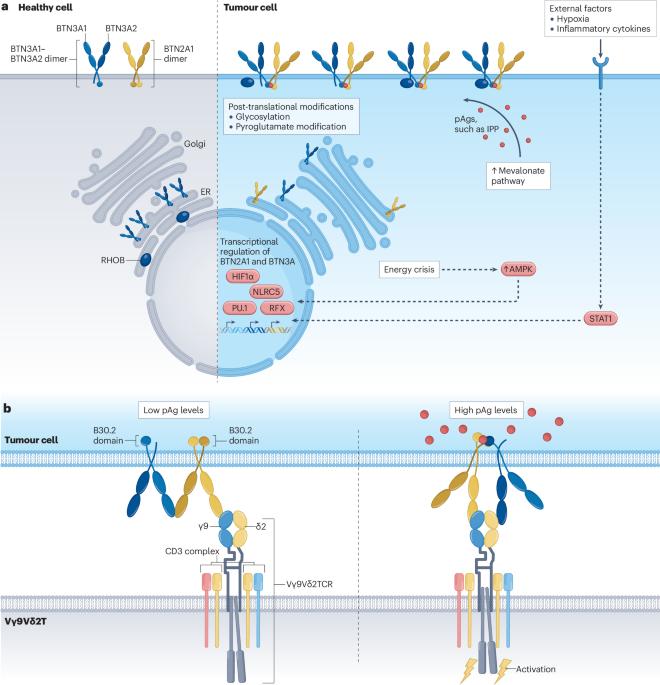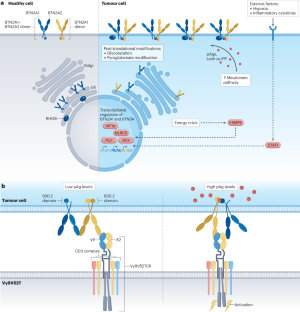破坏γδT细胞激活和抑制受体之间的平衡,以实现有效的癌症免疫治疗
IF 66.8
1区 医学
Q1 ONCOLOGY
引用次数: 0
摘要
癌症中的γδT细胞生物学已经研究了几十年,但仍然知之甚少,主要是由于临床前模型的物种差异和缺乏适当的分析工具。这种知识的缺乏阻碍了有希望的治疗概念的临床转化。近年来,先进的单细胞分析技术和全面的蛋白-蛋白相互作用研究改变了我们对γδT细胞及其受体的认识。这一发现揭示了利用γδT细胞用于治疗目的的新机遇和挑战。在此背景下,我们将讨论γδT细胞生物学的最新发现,特别关注它们在癌症免疫治疗中的作用。我们将探索克服耐受性的策略,并将γδT细胞及其受体的平衡转向抗肿瘤功效,这有可能成功转化为癌症免疫治疗的各种工程方法。本文章由计算机程序翻译,如有差异,请以英文原文为准。


Disrupting the balance between activating and inhibitory receptors of γδT cells for effective cancer immunotherapy
γδT cell biology in cancer has been studied for decades but remains poorly understood mainly due to species differences in preclinical models and a lack of appropriate analytical tools. This lack of knowledge has hindered the clinical translation of promising therapeutic concepts. In recent years, advanced single-cell analysis techniques and comprehensive protein–protein interaction studies have transformed our understanding of γδT cells and their receptors. This insight has revealed new opportunities and challenges in harnessing γδT cells for therapeutic purposes. In this context, we will discuss the latest findings in γδT cell biology, with a special focus on their role in cancer immune therapies. We will explore strategies to overcome tolerance and shift the balance of γδT cells and their receptors towards antitumour efficacy, which has the potential to successfully translate into various engineering approaches in cancer immunotherapy. In this Review, Beringer and colleagues highlight how future strategies for developing immunotherapies using γδT cells and their receptors will depend on creating intentional imbalances between activating and inhibitory receptors through the genetic engineering of γδT cell-inspired biologics and cellular therapies.
求助全文
通过发布文献求助,成功后即可免费获取论文全文。
去求助
来源期刊

Nature Reviews Cancer
医学-肿瘤学
CiteScore
111.90
自引率
0.40%
发文量
97
审稿时长
6-12 weeks
期刊介绍:
Nature Reviews Cancer, a part of the Nature Reviews portfolio of journals, aims to be the premier source of reviews and commentaries for the scientific communities it serves. The correct abbreviation for abstracting and indexing purposes is Nat. Rev. Cancer. The international standard serial numbers (ISSN) for Nature Reviews Cancer are 1474-175X (print) and 1474-1768 (online). Unlike other journals, Nature Reviews Cancer does not have an external editorial board. Instead, all editorial decisions are made by a team of full-time professional editors who are PhD-level scientists. The journal publishes Research Highlights, Comments, Reviews, and Perspectives relevant to cancer researchers, ensuring that the articles reach the widest possible audience due to their broad scope.
 求助内容:
求助内容: 应助结果提醒方式:
应助结果提醒方式:


